Transparency. Inclusivity. Safety. Accountability. Responsibility. Truth.
Today, these are the words you’ll find written on the walls of the Dentistry Building’s student lounge. They’re part of a mural painted by community artist Tonya Paris, based on community consultations at the Faculty of Dentistry’s outreach clinics. They speak to aspirations, principles, values.
Two years ago, the student lounge was a noted point of discussion during the Facebook incident that deeply affected both the Faculty of Dentistry and the university more broadly. Comments written on the lounge’s walls were referenced in two reports that followed (the Report from the Restorative Justice Process in the Faculty of Dentistry, and the Report of the Task Force on Misogyny, Sexism and Homophobia in the Faculty of Dentistry.)
Those joined several other reports in 2015 that provided shape and structure to a conversation that had been growing louder at şÚÁĎłÔąĎÍřand universities across North America and beyond: how do we confront systemic issues in our communities, and ensure diversity, inclusion and belonging become defining tenets of our institutions?
In the case of the Faculty of Dentistry and its students, much has changed in the two years since those reports. And while the repainted walls of the student lounge may seem a symbolic change, it’s one that speaks to a great deal of work, thought and reflection, indicative of the shifting attitudes needed to make cultural change.
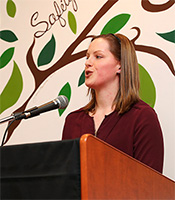 “We thought a lot about what was reflected on the walls of Facebook and our student bar room in 2015 and about how it came to be written,” said Abby Barton, who graduated in May with her DDS degree, when she spoke at the re-opening of the lounge earlier this year. “Changing the writing on the walls was a way of reflecting our commitments as a community. It also acknowledges our continued journey and ongoing learning, because we know that this work will never be done.”
“We thought a lot about what was reflected on the walls of Facebook and our student bar room in 2015 and about how it came to be written,” said Abby Barton, who graduated in May with her DDS degree, when she spoke at the re-opening of the lounge earlier this year. “Changing the writing on the walls was a way of reflecting our commitments as a community. It also acknowledges our continued journey and ongoing learning, because we know that this work will never be done.”
A renewed focus
For şÚÁĎłÔąĎÍř as a whole, that continued journey has been an impactful one in recent years.
It’s a journey that didn’t simply begin with Dal’s 2014 Strategic Direction, which committed the university (under priority 5.2) to “foster a collegial culture grounded in diversity and inclusiveness.” After all, the foundation of that commitment is built on the work countless faculty, staff and students over the years — individuals like Social Work Professor Wanda Thomas Bernard, appointed to the Senate of Canada last year, or Distinguished Public Service Fellow Mayann Francis, who prior to becoming the first African Nova Scotian Lieutenant Governor was the university’s first employment equity officer.
But what Dal’s Strategic Direction did was give that journey a new emphasis and, in December 2014, the Dentistry Facebook incident gave it new focus and urgency.
 “In responding to the Dentistry situation, we talked a lot about how important it was to move forward in addressing systemic issues like sexism, racism and homophobia guided by our values as a university, as an institution of higher learning,” says şÚÁĎłÔąĎÍřPresident Richard Florizone. “And those values aren’t something that can just sit on paper. They have to drive our plans, our programs, our actions.”
“In responding to the Dentistry situation, we talked a lot about how important it was to move forward in addressing systemic issues like sexism, racism and homophobia guided by our values as a university, as an institution of higher learning,” says şÚÁĎłÔąĎÍřPresident Richard Florizone. “And those values aren’t something that can just sit on paper. They have to drive our plans, our programs, our actions.”
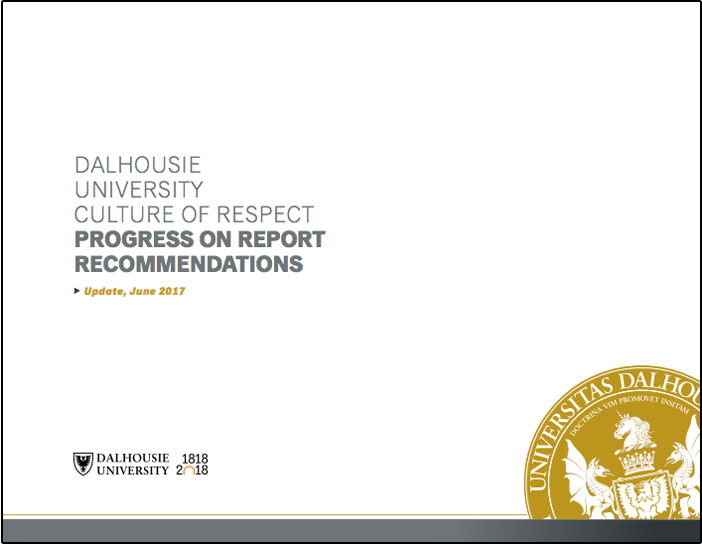 For the past two years, the university has been publishing a biannual update on efforts across the university to respond to the recommendations of four different reports published in 2015. They include: the March 2015 Belong report, commissioned by the Strategic Priority on Diversity and Inclusiveness; the May 2015 Report of the Restorative Justice Process in the Faculty of Dentistry; the June 2015 Report of the Task force on Misogyny, Sexism and Homophobia in the Faculty of Dentistry, chaired by Constance Backhouse; and the June 2015 , several of which focus on higher education.
For the past two years, the university has been publishing a biannual update on efforts across the university to respond to the recommendations of four different reports published in 2015. They include: the March 2015 Belong report, commissioned by the Strategic Priority on Diversity and Inclusiveness; the May 2015 Report of the Restorative Justice Process in the Faculty of Dentistry; the June 2015 Report of the Task force on Misogyny, Sexism and Homophobia in the Faculty of Dentistry, chaired by Constance Backhouse; and the June 2015 , several of which focus on higher education.
The updates on these reports — the most recent of which was published this June — present a line-by-line look at the impressive scope of work that’s ongoing. These efforts span the university’s 13 Faculties and many administrative units and speak to broad enthusiasm and energy for improving şÚÁĎłÔąĎÍřas a place to work and study.
But updates alone don’t tell the whole story.
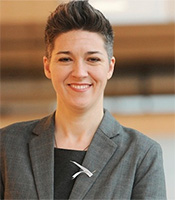 “I think the most significant change is a cultural one,” says Jasmine Walsh, assistant vice-president of Human Resources and co-lead for the strategic initiative on diversity and inclusiveness. “We’ve started to embed this work as part of our collective responsibility as an institution. Leaders are really stepping up. People whose job descriptions wouldn’t normally include diversity and inclusiveness are engaging actively in this work.”
“I think the most significant change is a cultural one,” says Jasmine Walsh, assistant vice-president of Human Resources and co-lead for the strategic initiative on diversity and inclusiveness. “We’ve started to embed this work as part of our collective responsibility as an institution. Leaders are really stepping up. People whose job descriptions wouldn’t normally include diversity and inclusiveness are engaging actively in this work.”
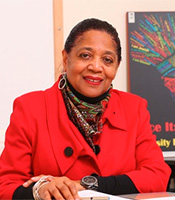 “It’s not a topic people are shying away from,” says Norma Williams, Dal’s first executive director of diversity and inclusiveness. “I see more readiness to lend an active and supportive voice to addressing matters of racism, sexism, islamophobia, homophobia and other forms of discrimination that are present at the university and in our community. And I see the care with which policy, programs and initiatives are being put in place to support diversity and inclusiveness.”
“It’s not a topic people are shying away from,” says Norma Williams, Dal’s first executive director of diversity and inclusiveness. “I see more readiness to lend an active and supportive voice to addressing matters of racism, sexism, islamophobia, homophobia and other forms of discrimination that are present at the university and in our community. And I see the care with which policy, programs and initiatives are being put in place to support diversity and inclusiveness.”
Leading institutional change
Williams’ hiring as executive director in late 2015 is one of the more prominent such initiatives on a university-wide scale over the past couple of years.
Another was the launch of the şÚÁĎłÔąĎÍřCensus, an effort to better understand the diversity of the Dal community. The university now has self-identification information for close to 90 per cent of full- and permanent part-time employees and has moved the needle in closing employment equity gaps in three key areas: Indigenous faculty, racially visible faculty and women in managerial roles.
Then there are the changes in Human Rights & Equity Services (HRES), formerly known as the Office of Human Rights, Equity and Harassment Prevention. The new name reflects a revitalized mission for the important Dal office, with a new strategic plan and an increase in the unit’s staff complement from two advisors to a team of seven.
Arig al Shaibah, vice-provost student affairs, who has been serving as acting executive director of HRES, says the changes allow the office to better support both sides of its dual mission: proactive community education and strategic equity and inclusion planning, as well as responsive human rights and conflict case management.
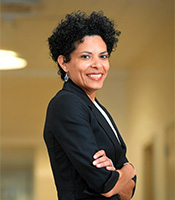 “It’s addressing individual cases and issues while at the same time addressing systemic issues,” says al Shaibah. “And the better we can do those two, together, the more we shift our culture.”
“It’s addressing individual cases and issues while at the same time addressing systemic issues,” says al Shaibah. “And the better we can do those two, together, the more we shift our culture.”
As for the importance of diversity, inclusion and equity to the Student Affairs mission, Al Shaibah says advancing equitable access to education, diversifying the student body, and providing safe and inclusive student experiences are essential components of the university’s vision for student affairs and student success. (This work has linkages to another 2015 report: the Report from the Committee on Aboriginal and Black/African Canadian Student Access and Retention, co-chaired by Kevin Hewitt and Amy Bombay).
“I was drawn to Dal in part because I was impressed with the commitment to diversity, inclusion and equity that was articulated, and it was exciting to think about doing this work in an environment that was striving for inclusive excellence,” says al Shaibah, who arrived at şÚÁĎłÔąĎÍřin April 2016. “And the infrastructure and foundation Dal is establishing around these issues helps me in my work.”
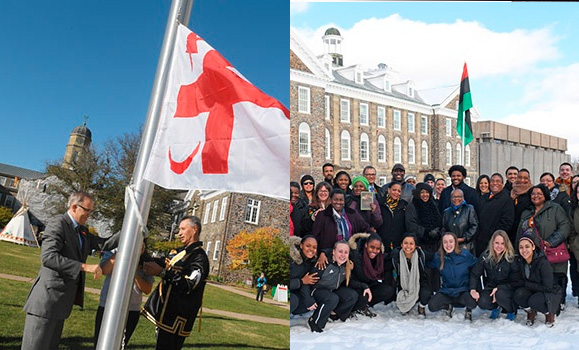
Raisings of the Mi'kmaq Grand Council Flag (left) and the Pan-African Flag.
The university also welcomed its new full-time ombudsperson last year (hiring Diane Hawco for the role); launched the first university-wide mental-health initiative (Thrive); hired a permanent advisor position for the now-renamed Indigenous Student Centre; and has put renewed emphasis on symbols of celebration and reflection: permanently installing the Mi’kmaq Grand Council Flag in recognition of Dalhousie’s placement on traditional Mi’kmaq territory, and hoisting the Pan-African Flag as part of African Heritage Month festivities.
Local leadership
Alongside all this, Faculties and units have been leading their own efforts. The majority now have their own committees focused on diversity and inclusion, like in Computer Science where the Faculty is aiming to to help close the gender gap in its profession (with a target of having women as 40 per cent of the student body by 2020).
In Dentistry, the Faculty that was the primary focus of two of the four 2015 reports, those efforts take on extra significance. The Faculty has been providing regular updates to Senate on its progress, alongside ongoing responses to the recommendations of the External Task Force. Across four main themes — communication, curriculum renewal, community outreach and reducing isolation — the Faculty has been working to lead lasting change, the sort that it hopes will leave a legacy much longer than that of the Facebook issue itself.
“The Faculty of Dentistry continues to work toward its goal of establishing and maintaining a working and learning environment in which everyone — faculty, staff, students, and patients — feels safe, included, and valued,” says Tom Boran, dean of the Faculty of Dentistry. “By addressing the recommendations of the Task Force and Restorative Justice reports, many new, rewarding and sustainable initiatives have been created.”
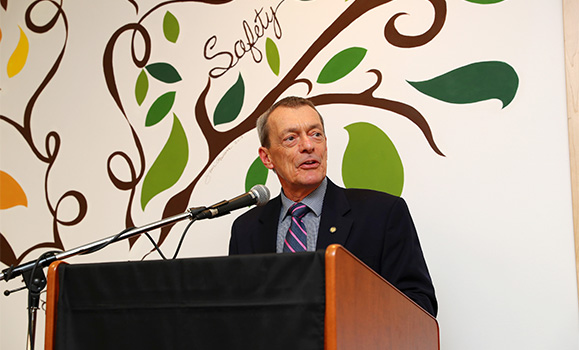
Tom Boran, Dentistry dean, speaking at the student lounge re-opening event.
Among the changes are increased training and lectures on professionalism and ethics in the curriculum; enhanced integration among dentistry and dental hygiene students; the launch of a “Women in Dentistry” circle to bring together female oral health professionals and students to talk about issues in their field; a revised Orientation week; new workshops and training for faculty/staff; a continued emphasis on outreach to underserved communities both locally and across the region; and various efforts to improve communication and collegiality within the Faculty.
While there is much still to do, the early signs are promising. The Faculty completed three major reviews this Spring, by the şÚÁĎłÔąĎÍřSenate, the Faculty of Graduate Studies and the Commission on Dental Accreditation of Canada. All three cited positive change and highlighted the importance of the Faculty’s ongoing efforts.
“I am so proud of the many ways in which our students and the greater oral health community have worked together to learn and grow from this experience,” says Dr. Boran, who completes his time as dean this June. “Professionalism, ethics, diversity and inclusion are issues that our community will continue to take very seriously, both inside and outside of the classroom.”
The journey ahead
This survey of the past two years is not to suggest that anyone feels their work on these issues is over and done with.
“With all that’s going on, it’s not over,” says Williams. “There is much more work to be done to maintain and sustain the good things that are happening here. We’ve certainly come a long way, but we need to be vigilant.”
The next steps of the journey will be shaped by the university’s new Diversity & Inclusiveness Strategy. Launched in April, it provides structure and focus to the university’s efforts in these areas, placing the work into researched framework around four pillars: climate and intergroup relations; student access and success; education and research; and institutional viability and vitality.
“It’s a framework that outlines key goals to becoming the kind of supportive, inclusive and diverse institution that we aspire to be,” says Walsh. “The strategy outlines a critical path for us to build the culture we want on our campuses.”
The university will also be adding a new senior leadership position connected with this work: university advisor & assistant vice-president, equity and inclusion. The position, which will be posted shortly, will report to the provost and be responsible for leading Dalhousie’s strategic planning, implementation and progress reporting to advance institutional diversity, inclusion and equity goals. The individual will also lead the Human Rights & Equity Services Office.
Then there’s the development of a comprehensive Indigenous Strategy for Dalhousie, a process currently underway under the leadership of a committee co-chaired by Keith Taylor (past dean of science and associate vice-president academic) and Patti Doyle-Bedwell (a faculty member and past director of Dal’s Transition Year Program, as well as past director of the Schulich School of Law’s Indigenous Black and Mi'kmaq Initiative.) The committee’s work has already led to both Board and Senate adopting the , and a full institution-wide strategy — addressing the TRC’s Call to Action, among other efforts — is expected to follow in the next 18 months or so.
And just like with the Dentistry student lounge, it’s important that all of this work is understood as more than just a fresh coat of paint. Progress toward a more respectful community — one where diversity and inclusion are not just words, but core values that strengthen the university and its mission — can only be made if individuals across şÚÁĎłÔąĎÍřcontinue to listen, to learn, and to lead the change they want to see made.
“If a university is to be a place of ideas, not only do we have to be open to all, but we have to support, celebrate and include all,” says President Florizone. “Because our diverse perspectives make us a stronger institution.”
* An earlier version of this story noted the reference to the Dentistry student lounge in the Backhouse Report, but it was also discussed in the Restorative Justice report. This has now been corrected.

